With the planet in crisis, some of the most impactful technological advancements today are focused on lessening humanity’s impact on the planet. The Sustainability winners of Fast Company’s inaugural Next Big Things in Tech awards are creating batteries that can power a renewable future. They’re reducing food waste (or turning it into fertilizer), making our appliances more efficient, and recycling everything from wood scraps and shingles to lithium-ion batteries.
See a full list of the Next Big Things in Tech across all categories here.


AppHarvest
For rethinking agriculture with massive indoor AI-powered farms
Aquaoso
For using data to help the world understand the future of water
Brightmark
For sustainably recycling all plastic types at scale
Fluence
For customizing LED lighting to help greenhouse farms prosper
HydroStor
For building underground caverns for long-term energy storage
Nature’s Fynd
For creating a healthy new protein source through advanced fermentation
